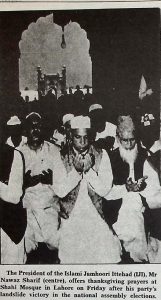
ISLAMABAD: Pakistan’s top leaders Thursday announced an ambitious “peaceful” nuclear plan and vowed to enhance the defense capability of the armed forces.
Addressing the nation over radio and television, the new premier Nawaz Sharif said rapid peaceful atomic development had become imperative in view of the recent increase in oil prices.
“We are against the use of a nuclear program for destructive purposes,” he said, adding that it was only aimed at boosting massive industrialization and ushering in an era of peace and prosperity.
Islamabad has repeatedly denied western media and intelligence. Reports about its nuclear weapons program by assuring it will utilize nuclear power only for the purpose of producing energy.
On October 1, Washington suspended economic and military aid to Pakistan, totaling nearly 600 million dollars, when President George Bush failed to certify that Pakistan did not possess nuclear weapons.
In his address to the joint session of parliament, President Ghulam Ishaq Khan declared that the new government would try to improve its defense capability “to an extent that the adversary will not dare harbor aggressive designs against us. The desire for peace and friendship is respected only when it is backed by a strong defense capability.”
Deposed premier Benazir Bhutto, who: had preferred to stay away from Nawaz Sharif’s swearing in ceremony last Tuesday, Thursday boycotted the presidential address.
Both president Ishaq Khan and Sharif stressed on the need to establish peaceful and good neighbourly relations with India. At the same time, they promised full support to secessionists in Jammu and Kashmir and said Pakistan’s government would continue to raise its voice to uphold the sanctity of the Babri mosque in Ayodhya, in the northern Indian state of Uttar Pradesh, which was the scene of violence on October 30 when Hindu fundamentalists attempted to demolish the mosque.
President Ishaq Khan said Pakistan was facing an uncertain situation on its borders. We do not want war under any circumstances, he said adding, however, that Kashmir was Pakistan’s life line and it was a national duty to extend moral and political support to the secessionists there. The new government will not tum away from this obligation, he said.
He hoped the Islamic Jamhoori Ittehad (IJI) government would work for a peaceful resolution of the Kashmir problem in accordance with the principles of the partition of the subcontinent and UN resolutions. Both leaders made no mention of the Shimla pact as the basis for the resolution of the Kashmir issue.
Conceding that some problems had cropped up in Pakistan’s relations with the United States, Khan said we will continue to value our relations with America, provided that does not impinge upon our independence and we are not expected to compromise on principles.
Premier Sharif announced his decision to life the emergency imposed by president Ishaq Khan on August 6, and spelt out the priorities of his government,
Outlining a wide ranging national reconstruction plan for Pakistan’s successful entry into the 21st century, Sharif, one of the country’s leading industrialists, announced a tax holiday to create a congenial atmosphere for free industrialization, transfer of sick units in the public sector to the private sector and inviting entrepreneurs to produce defense equipment.
He also promised an independent foreign policy.
He said the gulf crisis had left the government with no option but to increase the oil prices, but held assured taking steps to check prices of essential commodities.
Article extracted from this publication >> November 16, 1990